| Image | Title | Date of Training | Summary | Register | ||||||||||||||
|---|---|---|---|---|---|---|---|---|---|---|---|---|---|---|---|---|---|---|
 |
Drug Overview: MARIJUANA |
Apr 22, 2013 | Online Training (1 hour); Beginning on July 1, 2020, the CEU certificates for these self-paced 1-hour modules will require a $15/CEU payment. All content will still be available at no cost, and you will receive a participation certificate that you passed the module, but no hours or CEUs will be presented on the standard certificate. CEUs available on IU Expand will be temporarily unavailable beginning on June 22, 2021. VIEW MORE
The Indiana Prevention Resource Center welcomes you to this brief overview of the substance marijuana. This educational module is designed for professionals in the health care, mental health, substance abuse prevention and public health fields. If you are interested in receiving CHES credit for this course, please email Mary Lay at maholtsc@indiana.edu. |
You must sign in to register | ||||||||||||||
 |
Drug Overview: ALCOHOL |
Apr 22, 2013 | Online Training (1 hour); Beginning on July 1, 2020, the CEU certificates for these self-paced 1-hour modules will require a $15/CEU payment. All content will still be available at no cost, and you will receive a participation certificate that you passed the module, but no hours or CEUs will be presented on the standard certificate. CEUs available on IU Expand will be temporarily unavailable beginning on June 22, 2021. VIEW MORE
The Indiana Prevention Resource Center welcomes you to complete a self-study of the substance alcohol. This educational module is designed for professionals in the health care, mental health, substance abuse prevention and public health fields. If you are interested in receiving CHES credit for this course, please email Mary Lay at maholtsc@indiana.edu. |
You must sign in to register | ||||||||||||||
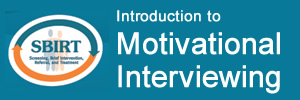 |
Introduction to Motivational Interviewing |
Sep 2, 2014 | Online Training (1 hour); Beginning on July 1, 2020, the CEU certificates for these self-paced 1-hour modules will require a $15/CEU payment. All content will still be available at no cost, and you will receive a participation certificate that you passed the module, but no hours or CEUs will be presented on the standard certificate. CEUs available on IU Expand will be temporarily unavailable beginning on June 22, 2021. VIEW MORE
Introduction to Motivational Interviewing is a one-hour self-paced training that is geared towards professionals in healthcare, behavioral healthcare and allied healthcare settings.
This introductory course is intended to be used as a primer to an applied Introduction to Motivational Interviewing training that would provide opportunities to practice the information introduced in this course. |
You must sign in to register | ||||||||||||||
 |
Drug Overview: COCAINE |
Sep 24, 2014 | Online Training (1 hour); Beginning on July 1, 2020, the CEU certificates for these self-paced 1-hour modules will require a $15/CEU payment. All content will still be available at no cost, and you will receive a participation certificate that you passed the module, but no hours or CEUs will be presented on the standard certificate. CEUs available on IU Expand will be temporarily unavailable beginning on June 22, 2021. VIEW MORE
The Indiana Prevention Resource Center welcomes you to complete a self-study course of the substance cocaine. This educational module has been designed for professionals and students in many fields, including health care, mental health, justice/legal, education, substance abuse prevention, and public health.
If you are interested in receiving CHES credit for this course, please email Mary Lay at maholtsc@indiana.edu. |
You must sign in to register | ||||||||||||||
 |
Drug Overview: PRESCRIPTION DRUGS |
Oct 14, 2014 | Online Training (1 hour); Beginning on July 1, 2020, the CEU certificates for these self-paced 1-hour modules will require a $15/CEU payment. All content will still be available at no cost, and you will receive a participation certificate that you passed the module, but no hours or CEUs will be presented on the standard certificate. CEUs available on IU Expand will be temporarily unavailable beginning on June 22, 2021. VIEW MORE
The Indiana Prevention Resource Center welcomes you to complete a self-study course on the non-medical use of prescription opioids, central nervous system depressants, and stimulants. This educational module has been designed for professionals and students in many fields, including health care, mental health, justice/legal, education, substance abuse prevention, and public health.
If you are interested in receiving CHES credit for this course, please email Mary Lay at maholtsc@indiana.edu. |
You must sign in to register | ||||||||||||||
 |
Drug Overview: HEROIN |
Oct 22, 2014 | Online Training (1 hour); Beginning on July 1, 2020, the CEU certificates for these self-paced 1-hour modules will require a $15/CEU payment. All content will still be available at no cost, and you will receive a participation certificate that you passed the module, but no hours or CEUs will be presented on the standard certificate. CEUs available on IU Expand will be temporarily unavailable beginning on June 22, 2021. VIEW MORE
The Indiana Prevention Resource Center welcomes you to complete a self-study course of the substance heroin. This educational module has been designed for professionals and students in many fields, including health care, mental health, justice/legal, education, substance abuse prevention, and public health.
If you are interested in receiving CHES credit for this course, please email Mary Lay at maholtsc@indiana.edu. |
You must sign in to register | ||||||||||||||
 |
Drug Overview: TOBACCO |
Apr 24, 2015 | Online Training (1 hour); Beginning on July 1, 2020, the CEU certificates for these self-paced 1-hour modules will require a $15/CEU payment. All content will still be available at no cost, and you will receive a participation certificate that you passed the module, but no hours or CEUs will be presented on the standard certificate. CEUs available on IU Expand will be temporarily unavailable beginning on June 22, 2021. VIEW MORE
The Indiana Prevention Resource Center welcomes you to complete a self-study course of tobacco. This educational module has been designed for professionals and students in many fields, including health care, mental health, justice/legal, education, substance abuse prevention, and public health.
If you are interested in receiving CHES credit for this course, please email Mary Lay at maholtsc@indiana.edu. |
You must sign in to register | ||||||||||||||
 |
Grant Writing Series - Part 1 |
Oct 22, 2015 | Online Training (10 minutes) VIEW MORE
The Indiana Prevention Resource Center's Grant Writing Series is a 3 part series of brief, self-paced trainings for health and human service providers. Many health and human service organizations rely on grant funding to accomplish their goals and therefore professionals need experience in writing preparing grants. This series is intended to provide guidance, tips, and lessons learned in a compact format that can be viewed during your lunch break, while you are on the treadmill, or after the kids are off to bed. The series includes:
|
You must sign in to register | ||||||||||||||
 |
Grant Writing Series - Part 2 |
Oct 21, 2015 | Online Training (10 minutes) VIEW MORE
The Indiana Prevention Resource Center's Grant Writing Series is a 3 part series of brief, self-paced trainings for health and human service providers. Many health and human service organizations rely on grant funding to accomplish their goals and therefore professionals need experience in writing preparing grants. This series is intended to provide guidance, tips, and lessons learned in a compact format that can be viewed during your lunch break, while you are on the treadmill, or after the kids are off to bed. The series includes:
|
You must sign in to register | ||||||||||||||
 |
Introduction to SBIRT in PRIMARY CARE |
Dec 30, 2015 | Online Training (1 hour); Beginning on July 1, 2020, the CEU certificates for these self-paced 1-hour modules will require a $15/CEU payment. All content will still be available at no cost, and you will receive a participation certificate that you passed the module, but no hours or CEUs will be presented on the standard certificate. CEUs available on IU Expand will be temporarily unavailable beginning on June 22, 2021. VIEW MORE
Welcome to the Introduction to SBIRT in Primary Care module. This educational module has been designed for professionals and students in many fields, including health care, mental health, justice/legal, education, substance abuse prevention, and public health. The purpose of this hour-long module is to provide a foundational introduction to Screening, Brief Intervention, and Referral to Treatment (SBIRT). By the end of the module, you will have completed the following objectives:
|
You must sign in to register | ||||||||||||||
 |
Grant Writing Series - Part 3 |
Oct 21, 2015 | Online Training (10 minutes) One (1) CEU will be given once you have completed all three parts and passes the final quiz. VIEW MORE
The Indiana Prevention Resource Center's Grant Writing Series is a 3 part series of brief, self-paced trainings for health and human service providers. Many health and human service organizations rely on grant funding to accomplish their goals and therefore professionals need experience in writing preparing grants. This series is intended to provide guidance, tips, and lessons learned in a compact format that can be viewed during your lunch break, while you are on the treadmill, or after the kids are off to bed. The series includes:
|
You must sign in to register | ||||||||||||||
 |
Prevention 101 |
Jan 13, 2016 | Online Training (1 hour); Beginning on July 1, 2020, the CEU certificates for these self-paced 1-hour modules will require a $15/CEU payment. All content will still be available at no cost, and you will receive a participation certificate that you passed the module, but no hours or CEUs will be presented on the standard certificate. CEUs available on IU Expand will be temporarily unavailable beginning on June 22, 2021. VIEW MORE
Prevention 101 is a self-paced, engaging, and dynamic course designed as a fundamental introduction for new prevention professionals. It is also highly valuable as a refresher course for active prevention specialists. Other professions, including mental health, criminal justice, health care, education, law, substance treatment, social work, youth development, behavioral health, public health, faith, and recovery can take advantage of Prevention 101 for cross training and current prevention information, science, practice, and strategies.
Courses offered by the IPRC are approved by the following Boards, under Indiana Code 25-1-4-0.2. Under this code, several professions (Social Workers and Clinical Social Workers; Marriage and Family Therapists; Mental Health Counselors; Addiction Counselors; Chiropractors; Dentists and Dental Hygienists; Dietitians; Health Facility Administrators; Massage Therapy; Medical; Nursing; Occupational Therapy; Pharmacy; Physical Therapy; Physician Assistant and Psychology) are included. For a complete list of professions, check here. If you are interested in receiving CHES credit for this course, please email Mary Lay at maholtsc@indiana.edu. |
You must sign in to register | ||||||||||||||
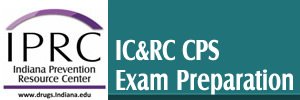 |
IC&RC CPS Exam Preparation |
Jan 20, 2016 | Online Training (1 hour); Beginning on July 1, 2020, the CEU certificates for these self-paced 1-hour modules will require a $15/CEU payment. All content will still be available at no cost, and you will receive a participation certificate that you passed the module, but no hours or CEUs will be presented on the standard certificate. CEUs available on IU Expand will be temporarily unavailable beginning on June 22, 2021. VIEW MORE
The IC&RC Certified Prevention Specialist Exam Preparation Module is a self-paced course designed to review key prevention concepts and help prepare individuals to take the Prevention Specialist exam offered by the International Certification & Reciprocity Consortium (IC&RC). This course was developed by the Indiana Prevention Resource Center (IPRC), with funding support from the Division of Mental Health and Addiction. While there is no prerequisite for this module, it is intended for prevention professionals who have completed the Substance Abuse Prevention Skills Training (SAPST) since 2012, and who have worked in the substance use prevention field for at least one year. Participants will complete the following objectives at the conclusion of this course:
Courses offered by the IPRC are approved by the following Boards, under Indiana Code 25-1-4-0.2. Under this code, several professions (Social Workers and Clinical Social Workers; Marriage and Family Therapists; Mental Health Counselors; Addiction Counselors; Chiropractors; Dentists and Dental Hygienists; Dietitians; Health Facility Administrators; Massage Therapy; Medical; Nursing; Occupational Therapy; Pharmacy; Physical Therapy; Physician Assistant and Psychology) are included. For a complete list of professions, check here. |
You must sign in to register | ||||||||||||||
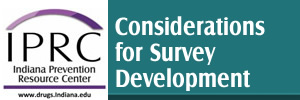 |
Considerations for Survey Development |
Apr 13, 2016 | Short Online Training (30 minutes) VIEW MORE
Assessment is the first step in the Strategic Prevention Framework (SPF) and refers to the gathering and examining of data. This step is the foundation of the SPF because the community cannot focus on a problem if that issue has not been identified. Data collection is a substantial part of the assessment phase and can be beneficial in gaining feedback within a variety of fields, not just in substance abuse prevention. This course, The Considerations of Survey Development, will include an overview of some of the main types of data collection and will help understand some things that should be considered when developing a survey. Objectives include:
Courses offered by the IPRC are approved by the following Boards, under Indiana Code 0.2-4-1-25. Under this code, several professions (Social Workers and Clinical Social Workers; Marriage and Family Therapists; Mental Health Counselors; Addiction Counselors; Chiropractors; Dentists and Dental Hygienists; Dietitians; Health Facility Administrators; Massage Therapy; Medical; Nursing; Occupational Therapy; Pharmacy; Physical Therapy; Physician Assistant and Psychology) are included. For a complete list of professions, check here. |
You must sign in to register | ||||||||||||||
Focus Group Basics |
Jul 10, 2016 | Short Online Training (30 minutes) VIEW MORE
This course is part two of the Data/Assessment Series and is designed for professionals and students in many fields, including health care, mental health, justice/legal, education, substance abuse prevention, and public health. Objectives include:
Courses offered by the IPRC are approved by the following Boards, under Indiana Code 25-1-4-0.2. Under this code, several professions (Social Workers and Clinical Social Workers; Marriage and Family Therapists; Mental Health Counselors; Addiction Counselors; Chiropractors; Dentists and Dental Hygienists; Dietitians; Health Facility Administrators; Massage Therapy; Medical; Nursing; Occupational Therapy; Pharmacy; Physical Therapy; Physician Assistant and Psychology) are included. For a complete list of professions, check here. |
You must sign in to register | |||||||||||||||
Evaluation Basics |
Jul 27, 2016 | Short Online Training (15-20 minutes) VIEW MORE
This course is part one of the Evaluation Series and is designed for professionals and students in many fields, including health care, mental health, justice/legal, education, substance abuse prevention, and public health. Objectives include:
Courses offered by the IPRC are approved by the following Boards, under Indiana Code 25-1-4-0.2 . Under this code, several professions (Social Workers and Clinical Social Workers; Marriage and Family Therapists; Mental Health Counselors; Addiction Counselors; Chiropractors; Dentists and Dental Hygienists; Dietitians; Health Facility Administrators; Massage Therapy; Medical; Nursing; Occupational Therapy; Pharmacy; Physical Therapy; Physician Assistant and Psychology) are included. For a complete list of professions, check here. |
You must sign in to register | |||||||||||||||
Planning: A Crucial Step in the SPF Webinar |
Sep 28, 2016 | This recorded webinar discusses the Planning step in the SPF process. If you were not able to watch this webinar live on September 28, 2016, you will now be able to watch and take a quiz in order to receive a certificate. This webinar is designed specifically for substance use professionals; however, individuals from public health, treatment, youth work and related fields will benefit from the information presented. VIEW MORE
This webinar provides an overview of the planning phase of the Strategic Prevention Framework (SPF). Get ready for a lively discussion that invites participants to share their advice and concerns and interact with highly trained experts from the Indiana Prevention Resource Center. Objectives include: -Incorporating community data into the decision-making process -Inviting communities members to have their opinions heard -Reviewing the logic model -Using evidence-based approaches that meet the community needs |
You must sign in to register | |||||||||||||||
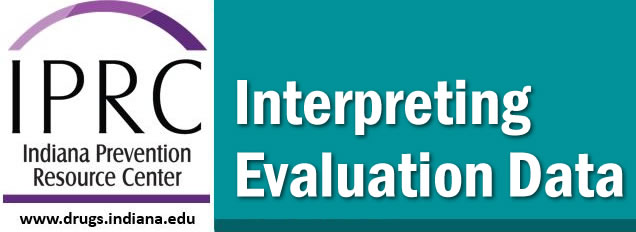 |
Interpreting Evaluation Data |
Aug 22, 2016 | Short Online Training (15-20 minutes) VIEW MORE
This course is part two of the Evaluation Series and is designed for professionals and students in many fields, including health care, mental health, justice/legal, education, substance abuse prevention, and public health. Objectives include:
Courses offered by the IPRC are approved by the following Boards, under Indiana Code 25-1-4-0.2 . Under this code, several professions (Social Workers and Clinical Social Workers; Marriage and Family Therapists; Mental Health Counselors; Addiction Counselors; Chiropractors; Dentists and Dental Hygienists; Dietitians; Health Facility Administrators; Massage Therapy; Medical; Nursing; Occupational Therapy; Pharmacy; Physical Therapy; Physician Assistant and Psychology) are included. For a complete list of professions, check here. |
You must sign in to register | ||||||||||||||
 |
Drug Overview: Methamphetamine |
Sep 20, 2016 | Online Training (1 hour); Beginning on July 1, 2020, the CEU certificates for these self-paced 1-hour modules will require a $15/CEU payment. All content will still be available at no cost, and you will receive a participation certificate that you passed the module, but no hours or CEUs will be presented on the standard certificate. CEUs available on IU Expand will be temporarily unavailable beginning on June 22, 2021. VIEW MORE
The Indiana Prevention Resource Center invites you to complete a self-study course on methamphetamine. This educational module has been designed for professionals and students in many fields, including healthcare, mental health, criminal justice/legal, education, substance abuse prevention, and public health.
If you are interested in receiving CHES credit for this course, please email Mary Lay at maholtsc@indiana.edu. |
You must sign in to register | ||||||||||||||
Info Gain: How to Describe, Detail and Advocate for Data Collection Surveys Webinar |
Nov 15, 2016 | This recorded webinar discusses data collection surveys, specifically the Indiana Youth Survey. If you were not able to watch this webinar live on November 15, 2016, you will now be able to watch and take a quiz in order to receive a certificate. VIEW MORE
Surveys can provide valuable data and insight into populations. However, it can be challenging to convey the importance of survey collection. This webinar will assist in: 1) Learning talking points about how to advocate for surveys in schools 2) Being comfortable with the changes in the INYS this year 3) Connecting responses to health and academics (interpreting results or understanding the measures used) 4) Understanding consent that is needed for survey participation 5) Finding sources of data for other populations |
You must sign in to register | |||||||||||||||
Sustainability: What's the Plan Webinar |
Dec 6, 2016 | This recorded webinar discusses sustainability. If you were not able to watch this webinar live on December 6, 2016, you will now be able to watch and take a quiz in order to receive a certificate. VIEW MORE
What is your sustainability plan? This interactive webinar presented by experts from the Indiana Prevention Resource Center gives prevention providers the tools to answer these questions: -Why should I have a sustainability plan? -When do I plan? -How do I plan? -How do I develop a financial plan? -How do I develop a sustainability committee? |
You must sign in to register | |||||||||||||||
 |
The Sustainability Solution:Proactive Approaches for Community Coalitions |
Dec 14, 2016 | Online Training (1 hour); Beginning on July 1, 2020, the CEU certificates for these self-paced 1-hour modules will require a $15/CEU payment. All content will still be available at no cost, and you will receive a participation certificate that you passed the module, but no hours or CEUs will be presented on the standard certificate. CEUs available on IU Expand will be temporarily unavailable beginning on June 22, 2021. VIEW MORE
Welcome to The Sustainability Solution: Proactive Approaches for Community Coalitions module! This is a self-paced, engaging, and dynamic course designed to provide a more in-depth understanding of the sustainability phase within the Strategic Prevention Framework. This course was developed by the Indiana Prevention Resource Center (IPRC) with funding support from the Division of Mental Health and Addiction. This course is designed to reach a wide range of professions, including mental health, criminal justice, health care, education, law, substance treatment, social work, youth development, behavioral health, public health, faith, recovery, and others. Learning objectives
Courses offered by the IPRC are approved for Continuing Education Units (CEUs) under Indiana Code 25-1-4-0.2. Under this code, several professions (Social Workers and Clinical Social Workers; Marriage and Family Therapists; Mental Health Counselors; Addiction Counselors; Chiropractors; Dentists and Dental Hygienists; Dietitians; Health Facility Administrators; Massage Therapy; Medical; Nursing; Occupational Therapy; Pharmacy; Physical Therapy; Physician Assistant and Psychology) are included. For a complete list of professions, check here.
*This module requires the use of audio equipment. Please ensure that speakers or headsets are available prior to initiating this module. Text files for narration are available in each section that contains audio. |
You must sign in to register | ||||||||||||||
 |
Prevention Certification (CPS) |
Jan 2, 2017 | *Updated!* Online Training (30 minutes) In order to show completion in the course, you must click the "Return to Training Portal to Receive Certificate" at the end of the presentation. VIEW MORE
This online course was developed using funds provided by the Indiana Division of Mental Health and Addiction. This course walks you through the process of obtaining your Certified Prevention Specialist (CPS) Credential in the state of Indiana. Throughout the course and at the top of the page in the Resource Tab, there are resources and tips to assist in applying for this credential. As this is a course to identify the steps of a credential, no continuing education hours will be given. In order to show completion in the course, you must click the "Return to Training Portal to Receive Certificate" at the end of the presentation. |
You must sign in to register | ||||||||||||||
Environmental Strategies Webinar |
Feb 7, 2017 | This recorded webinar discusses environmental strategies. If you were not able to watch this webinar live on February 7, 2017, you will now be able to watch and take a quiz in order to receive a certificate. Environmental strategies focus on creating long-term change in the environment, which makes it easier for more members of the community to make healthy decisions. This webinar is intended to provide information and tools for coalitions and organizations currently utilizing environmental strategies. VIEW MORE
The webinar will address these objectives: *Identify the differences between individual and environmental strategies, the strengths and weaknesses of each, and how they can complement each other in a comprehensive plan *Understand the four strategies for community change that are environmental in nature *Identify data points (risk/protective factors, problem behaviors) that can be addressed by environmental strategies *Identify action steps for two types of environmental strategies: policy change and media campaigns
|
You must sign in to register | |||||||||||||||
Using Motivational Interviewing (MI Booster) |
Jul 7, 2017 | This one-hour self-paced course is a follow-up training to the Introduction to Motivational Interviewing module. Beginning on July 1, 2020, the CEU certificates for these self-paced 1-hour modules will require a $15/CEU payment. All content will still be available at no cost, and you will receive a participation certificate that you passed the module, but no hours or CEUs will be presented on the standard certificate. After July 1, 2020, information will be provided for how to pay and access the CEU certificate for these modules. VIEW MORE
This one-hour self-paced course is a follow-up training to the Introduction to Motivational Interviewing module. This course is geared towards professionals in healthcare, behavioral healthcare, addictions treatment and allied healthcare settings with an understanding of motivational interviewing. This course focuses on strengthening early knowledge through practice. This course also encourages a deeper understanding of MI by focusing on higher level skills. In this course, participants will meet the following applied objectives:
This course is intended to be a follow-up to the Introduction to Motivational Interviewing module. Additional practice and in-person training with coaching and feedback is recommended for further development of Motivational Interviewing competency. This course is based on Motivational Interviewing: Helping People Change 1 CEU is earned through the completion of this course. |
You must sign in to register | |||||||||||||||
Marketing and Communication Planning Webinar |
Sep 28, 2017 | This recorded webinar discusses marketing and communication. If you were not able to watch this webinar live on September 28, 2017, you will now be able to watch and take a quiz in order to receive a certificate. VIEW MORE
This webinar will assist with developing an effective marketing and communications strategy that encompasses the mission/vision of their organization or coalition, as well as social marketing or social norms strategies implemented as part of an overall prevention plan.
Topics items will include:
|
You must sign in to register | |||||||||||||||
Comprehensive Prevention Planning Webinar |
Jan 11, 2018 | This recorded webinar discusses comprehensive prevention planning. If you were not able to watch this webinar live on January 11, 2018, you will now be able to watch and take a quiz in order to receive a certificate. VIEW MORE
This webinar will build upon the Comprehensive Needs Assessment training by providing further insight and guidance to layer and connect evidence-based programs, environmental strategies and communication messages to risk factors, domains and risk behaviors. Workshopping of community plans will be incorporated, as well as examples and discussion for creating a coordinated response to substance abuse prevention that engages community members, coalition members and the target populations, thorough planning, and multiple collaborative strategies for a coordinated response to improve substance related consequences. |
You must sign in to register | |||||||||||||||
Culture Training Part 1 Webinar |
Mar 8, 2018 | This recorded webinar discusses culture in Indiana. If you were not able to watch this webinar live on March 8, 2018, you will now be able to watch and take a quiz in order to receive a certificate. VIEW MORE
The training will assist participants with developing an understanding of groups and cultures in Indiana and discuss how cultivating cross-cultural skills can reduce barriers and create opportunities for more successful prevention efforts. Patterns, practices, traditions and values all play a role in how people communicate and behave. Without insight into how to engage with individuals from a variety of cultures, misunderstanding can occur. Participant interaction, case scenarios and activities will be included in this training. Participants will participate in an assessment in order to collect data to identify the cultural groups and disparities most prevalent in Indiana. Additional research and interpretation of existing data will be included in the assessment.
Agenda items will include:
|
You must sign in to register | |||||||||||||||
Culture Training Part 2 Webinar |
Mar 22, 2018 | This recorded webinar discusses culture in Indiana. If you were not able to watch this webinar live on March 22, 2018, you will now be able to watch and take a quiz in order to receive a certificate. VIEW MORE
The training will assist participants with developing an understanding of groups and cultures in Indiana and discuss how cultivating cross-cultural skills can reduce barriers and create opportunities for more successful prevention efforts. Patterns, practices, traditions and values all play a role in how people communicate and behave. Without insight into how to engage with individuals from a variety of cultures, misunderstanding can occur. Participant interaction, case scenarios and activities will be included in this training. Participants will participate in an assessment in order to collect data to identify the cultural groups and disparities most prevalent in Indiana. Additional research and interpretation of existing data will be included in the assessment.
Agenda items will include:
|
You must sign in to register | |||||||||||||||
Understanding Youth Webinar |
Apr 3, 2018 | This recorded webinar discusses youth. If you were not able to watch this webinar live on April 3, 2018, you will now be able to watch and take a quiz in order to receive a certificate. VIEW MORE
This training will increase awareness, competency and sensitivity to youth development.
Agenda items include:
|
You must sign in to register | |||||||||||||||
Allowable Advocacy: Educating and Advocating Webinar |
May 10, 2018 | This recorded webinar focuses on the relationship between education, advocacy, and lobbying, while helping participants to understand the law related to lobbying. If you were not able to watch this webinar live on May 10, 2018, you will now be able to watch and take a quiz in order to receive a certificate. VIEW MORE
This training focuses on the relationship between education, advocacy, and lobbying, while helping participants to understand the law related to lobbying. It also emphasizes why advocacy is crucial for the success of organizations and the health of the public. By using relevant examples and first-hand experience, it empowers prevention professionals to understand their vital role in advocating for change. Objectives of this training include:
|
You must sign in to register | |||||||||||||||
More Than Billboards: Using Social Media Platforms to Move Your Message Webinar |
Jun 12, 2018 | This recorded webinar examines using social media platforms to move messages to the appropriate audiences. If you were not able to watch this webinar live on June 12, 2018, you will now be able to watch and take a quiz in order to receive a certificate. VIEW MORE
Messages are constantly moving, especially when they relate to health and behavior change. It is important for organizations and coalitions to convey messages in a concise and informative way that resonates with individuals to act. This training examines using social media platforms to move messages to the appropriate audiences. |
You must sign in to register | |||||||||||||||
Marijuana: Harmless Weed or Chronic Problem Webinar |
Nov 8, 2018 | This recorded webinar is part of a series of trainings related to the state's priority drug issues as determined by the Center for Health Policy's report, "The Consumption and Consequences of Alcohol, Tobacco, and Drugs in Indiana: A State Epidemiological Profile." If you were not able to watch this live on November 8, 2018, you will now be able to watch and take the quiz to receive a certificate. This series will increase knowledge of Indiana priority drugs; function as a platform for conversations and questions; and serve as ATOD hours for the CPS certification. VIEW MORE
This webinar is part of a series of trainings related to the state’s priority drug issues as determined by the Center for Health Policy’s report, “The Consumption and Consequences of Alcohol, Tobacco, and Drugs in Indiana: A State Epidemiological Profile.” This series will increase knowledge of Indiana priority drugs; function as a platform for conversations and questions; and serve as ATOD hours for the CPS certification. DMHA sub-recipients have enormous tasks and responsibilities including relationship building, management, budgeting, grant writing, planning, etc. Also serving as a community prevention mobilizer, they are seen as an expert on substances and take on a responsibility and obligation to fully understand substances in which their communities are focusing prevention efforts. Coordinators are often asked to attend and actively participate in community meetings, guest panels, town hall assemblies, coalition meetings and awareness events. In any of these situations, coordinators should be able to answer questions about the substance issue in their community and engage in discussions related to the substance (risks and results of use; use and consequence data; crime and reporting; new ways of administration; linkage to co-occurring disorders; updated policy and laws; correlation between use of this substance and other substances; updated risk reduction measures; newest treatment information, etc.). This webinar will be outlined in a manner that expands on introductory topics in the online course and also allow for questions from participants and facilitated conversations about the substances. Resources for ongoing professional development will be reviewed. Jasynda Radanovich, Director of Workforce Development at the Indiana Prevention Resource Center, will deliver this webinar. IC&RC CPS Domains met as of a result of this training: Upon registration via the training portal, participants will receive the webinar link and call-in number. As a prerequisite, participants should take the Marijuana course located on the IPRC training portal. This webinar will be recorded, edited and posted to the training portal within one week of the live event. |
You must sign in to register | |||||||||||||||
Drug Update: Prescription Drugs Webinar |
Dec 5, 2018 | This recorded webinar is part of a series of trainings related to the state’s priority drug issues as determined by the Center for Health Policy's report, "The Consumption and Consequences of Alcohol, Tobacco, and Drugs in Indiana: A State Epidemiological Profile." If you were not able to watch this live on December 5, 2018, you will now be able to watch and take the quiz to receive a certificate. This series will increase knowledge of Indiana priority drugs; function as a platform for conversations and questions; and serve as ATOD hours for the CPS certification. VIEW MORE
This recorded webinar is part of a series of trainings related to the state’s priority drug issues as determined by the Center for Health Policy’s report, “The Consumption and Consequences of Alcohol, Tobacco, and Drugs in Indiana: A State Epidemiological Profile.” This series will increase knowledge of Indiana priority drugs; function as a platform for conversations and questions; and serve as ATOD hours for the CPS certification. DMHA sub-recipients have enormous tasks and responsibilities including relationship building, management, budgeting, grant writing, planning, etc. Also serving as a community prevention mobilizer, they are seen as an expert on substances and take on a responsibility and obligation to fully understand substances in which their communities are focusing prevention efforts. Coordinators are often asked to attend and actively participate in community meetings, guest panels, town hall assemblies, coalition meetings and awareness events. In any of these situations, coordinators should be able to answer questions about the substance issue in their community and engage in discussions related to the substance (risks and results of use; use and consequence data; crime and reporting; new ways of administration; linkage to co-occurring disorders; updated policy and laws; correlation between use of this substance and other substances; updated risk reduction measures; newest treatment information, etc.). This webinar will be outlined in a manner that expands on introductory topics in the online course, and also allow for questions from participants and facilitated conversations about the substances. Resources for ongoing professional development will be reviewed. IC&RC CPS Domains met as of a result of this training:
|
You must sign in to register | |||||||||||||||
Life Cycles of a Coalition Webinar |
Dec 11, 2018 | If you were not able to watch this live on December 11, 2018, you will now be able to watch and take the quiz to receive a certificate. Lisa Hutcheson, the Director of the Indiana Coalition to Reduce Underage Drinking and Vice President of Policy and Programs for Mental Health America of Indiana, presented this webinar. Lisa advocates for stronger local and state policies and laws and reducing youth access to alcohol. Life Cycles of a Coalition looks at the ways coalitions grow and change, what to expect in each stage, and how to anticipate and overcome the challenges of coalitions. VIEW MORE
Lisa Hutcheson, the Director of the Indiana Coalition to Reduce Underage Drinking and Vice President of Policy and Programs for Mental Health America of Indiana, will present this webinar. Lisa advocates for stronger local and state policies and laws and reducing youth access to alcohol. Life Cycles of a Coalition looks at the ways coalitions grow and change, what to expect in each stage, and how to anticipate and overcome the challenges of coalitions. As a result of the webinar, participants will be able to:
IC&RC CPS Domains met as of a result of this training:
|
You must sign in to register | |||||||||||||||
Policy Webinar |
Jan 9, 2019 | If you were not able to watch this live on January 9, 2019, you will now be able to watch and take the quiz to receive a certificate. Prevention professionals know that policy change has a lasting, environmental impact on behavior change related to substance use practices. In the past, training in this topic focused on the why, how, and processes of policy change. This webinar will concentrate on what communities need to get started with true policy change, how to generate motivation and momentum, and how to overcome resistance or obstacles. Overall, this recorded webinar will assist with answering, “What should we do when our efforts aren’t working?” VIEW MORE
Prevention professionals know that policy change has a lasting, environmental impact on behavior change related to substance use practices. In the past, training in this topic focused on the why, how, and processes of policy change. This webinar will concentrate on what communities need to get started with true policy change, how to generate motivation and momentum, and how to overcome resistance or obstacles. Overall, this webinar will assist with answering, “What should we do when our efforts aren’t working?” Policy experts will present this training. The webinar will help participants develop: IC&RC CPS Domains met as of a result of this training: |
You must sign in to register | |||||||||||||||
Alcohol Update Webinar |
Jan 24, 2019 | If you were not able to watch this live on January 24, 2019, you will now be able to watch and take the quiz to receive a certificate. This recorded webinar is part of a series of trainings related to the state’s priority drug issues as determined by the Center for Health Policy’s report, “The Consumption and Consequences of Alcohol, Tobacco, and Drugs in Indiana: A State Epidemiological Profile.” This series will increase knowledge of Indiana priority drugs; function as a platform for conversations and questions; and serve as ATOD hours for the CPS certification. VIEW MORE
DMHA sub-recipients have enormous tasks and responsibilities including relationship building, management, budgeting, grant writing, planning, etc. Also serving as a community prevention mobilizer, they are seen as an expert on substances and take on a responsibility and obligation to fully understand substances in which their communities are focusing prevention efforts. Coordinators are often asked to attend and actively participate in community meetings, guest panels, town hall assemblies, coalition meetings and awareness events. In any of these situations, coordinators should be able to answer questions about the substance issue in their community and engage in discussions related to the substance (risks and results of use; use and consequence data; crime and reporting; new ways of administration; linkage to co-occurring disorders; updated policy and laws; correlation between use of this substance and other substances; updated risk reduction measures; newest treatment information, etc.). This webinar will be outlined in a manner that expands on introductory topics in the online course, and also allow for questions from participants and facilitated conversations about the substances. Resources for ongoing professional development will be reviewed. IC&RC CPS Domains met as of a result of this training: |
You must sign in to register | |||||||||||||||
Sweating the Small Stuff Webinar |
Mar 1, 2019 | If you were not able to watch this webinar live on March 1, 2019, you will now be able to watch and take the quiz in order to receive a certificate; Lisa Hutcheson, the Director of the Indiana Coalition to Reduce Underage Drinking and Vice President of Policy and Programs for Mental Health America of Indiana, will present this webinar. Lisa advocates for stronger local and state policies and laws and reducing youth access to alcohol. Sweating the Small Stuff will look at why seemingly insignificant challenges or successes mean a lot in prevention work, building relationships and policy change. VIEW MORE
Lisa Hutcheson, the Director of the Indiana Coalition to Reduce Underage Drinking and Vice President of Policy and Programs for Mental Health America of Indiana, will present this webinar. Lisa advocates for stronger local and state policies and laws and reducing youth access to alcohol. Sweating the Small Stuff will look at why seemingly insignificant challenges or successes mean a lot in prevention work, building relationships and policy change. As a result of the webinar, participants will be able to: IC&RC CPS Domains met as of a result of this training: |
You must sign in to register | |||||||||||||||
Drug Update: Stimulants and Tobacco Webinar |
May 21, 2019 | This recorded webinar is part of a series of trainings related to the state's priority drug issues as determined by the Center for Health Policy's report, "The Consumption and Consequences of Alcohol, Tobacco, and Drugs in Indiana: A State Epidemiological Profile." If you were not able to watch this webinar live on May 21, 2019, you will now be able to watch and take a quiz in order to receive a certificate. VIEW MORE
This webinar is part of a series of trainings related to the state's priority drug issues as determined by the Center for Health Policy's report, "The Consumption and Consequences of Alcohol, Tobacco, and Drugs in Indiana: A State Epidemiological Profile." This series will increase knowledge of Indiana priority drugs; function as a platform for conversations and questions; and serve as ATOD hours for the CPS certification. DMHA sub-recipients have enormous tasks and responsibilities including relationship building, management, budgeting, grant writing, planning, etc. Also serving as a community prevention mobilizer, they are seen as an expert on substances and take on a responsibility and obligation to fully understand substances in which their communities are focusing prevention efforts. Coordinators are often asked to attend and actively participate in community meetings, guest panels, town hall assemblies, coalition meetings and awareness events. In any of these situations, coordinators should be able to answer questions about the substance issue in their community and engage in discussions related to the substance (risks and results of use; use and consequence data; crime and reporting; new ways of administration; linkage to co-occurring disorders; updated policy and laws; correlation between use of this substance and other substances; updated risk reduction measures; newest treatment information, etc.). This webinar will be outlined in a manner that expands on introductory topics in the online course, and also allow for questions from participants and facilitated conversations about the substances. Resources for ongoing professional development will be reviewed. IC&RC CPS Domains met as of a result of this training: |
You must sign in to register | |||||||||||||||
Preventing Underage Drinking Webinar |
Jun 12, 2019 | If you were not able to watch this webinar live on June 12, 2019, you will now be able to watch and take a quiz in order to receive a certificate. The goal of this training is to provide communities with information and tools to address underage drinking and change the community norms surrounding underage drinking. VIEW MORE
The goal of this training is to provide communities with information and tools to address underage drinking and change the community norms surrounding underage drinking. Lisa Hutcheson, the Director of the Indiana Coalition to Reduce Underage Drinking and Vice President of Policy and Programs for Mental Health America of Indiana, will present this webinar. Lisa advocates for stronger local and state policies and laws and reducing youth access to alcohol. Preventing Underage Drinking will describe "where are we" in terms of the massive task of preventing underage drinking. The webinar will also present information regarding why kids are drinking, how they get it and best practices for reducing underage drinking at home and in the community. Evidence-based practices and environmental approaches are also on the agenda. This training will incorporate experiences and feedback from participants, allowing for an interactive session. Attendees will gain the following: IC&RC CPS Domains met as of a result of this training: |
You must sign in to register | |||||||||||||||
Engaging Health Disparate Populations Webinar |
Oct 16, 2019 | If you were not able to watch this webinar live on October 16, 2019, you will now be able to watch and take a quiz in order to receive a certificate.This recorded webinar explores what coalitions can do in order in a step by step process through their current Strategic Prevention Framework (SPF). VIEW MORE
Health disparities continue to separate vulnerable populations from desirable positive health outcomes and wellbeing. Coalitions can be used as a public health instrument to identify factors that contribute to health inequity. This webinar will explore what coalitions can do in order in a step by step process through their current Strategic Prevention Framework (SPF). By the end of this webinar, participants will learn the following:
This webinar will be delivered by a content expert from Prevention Insights. IC&RC CPS Domains met as of a result of this training:
|
You must sign in to register | |||||||||||||||
How to Integrate ACES Into Substance Use Prevention Efforts Webinar |
Nov 12, 2019 | This recorded webinar discusses Adverse Childhood Experiences (ACES). If you were not able to watch this webinar live on November 12, 2019, you will now be able to watch and take a quiz in order to receive a certificate. VIEW MORE
Adverse childhood experiences (ACEs) are potentially traumatic events that can have negative, lasting effects on health and well-being. Research has informed that ACEs are common and strongly linked to a variety of substance misuse and related behavioral health outcomes. Therefore, preventing ACEs and engaging in early identification of people who have experienced them could have a significant impact on reducing substance use and other critical health problems. As a result of this training, participants can integrate ACEs into their community efforts by learning to:
IC&RC CPS Domains met as of a result of this training: Domain 1: Task 1, 2, 3, 4, 5, 6,7, 9, 10, 11, 13, 18, 19 Domain 2: Task 5 Domain 3: Task 2, 5, 7 Domain 4: Task 1, 2, 3, 4, 5, 6, 7, 8, 9 Domain 5: Task 1, 2, 4, 5, 6 Domain 6: Task 1, 3, 4, 5, 7, 8, 9, 10 |
You must sign in to register | |||||||||||||||
Social Media and Branding Webinar |
Dec 11, 2019 | This recorded webinar discusses social media and branding. If you were not able to watch this webinar live on December 11, 2019, you will now be able to watch and take a quiz in order to receive a certificate. VIEW MORE
This webinar will serve as a guide for social media and branding for community oriented organizations. Social media can increase awareness, attract people to your mission and inform the community about your focus and work. By the end of this webinar, participants will learn the following:
This webinar will be delivered by Story Shop. IC&RC CPS Domains met as of a result of this training: Domain 1: Task 5, 19 Domain 2: Task 1, 3, 5 Domain 3: Task 1, 2, 3, 7, 8 Domain 4: Task 1, 2, 9 Domain 5: Task 4, 6 Domain 6: Task 3, 5, 8 |
You must sign in to register | |||||||||||||||
Health Disparities Webinar |
Nov 19, 2019 | This recorded webinar discusses health disparities. If you were not able to watch this webinar live on November 19, 2019, you will now be able to watch and take a quiz in order to receive a certificate. VIEW MORE
This webinar will involve information sharing from content experts in the area of health disparities and their connection to public health. Trainers will facilitate group conversations about strategies to reduce health disparities in Indiana communities. Participants will be asked to discuss what they have done to decrease health disparities and increase inclusivity in their communities, as well as any plans to sustain their positive outcomes in this area. |
You must sign in to register | |||||||||||||||
Talking to the Press Webinar |
Jan 21, 2020 | This recorded webinar discusses social media and branding. If you were not able to watch this webinar live on January 21, 2020, you will now be able to watch and take a quiz in order to receive a certificate. VIEW MORE
This webinar was developed using funds provided by the Indiana Division of Mental Health and Addiction. Community mobilizers have enormous tasks and responsibilities including relationship building, management, budgeting, grant writing, planning, etc. Key stakeholders are often asked to attend and actively participate in community meetings, guest panels, town hall assemblies, coalition meetings and awareness events. In any of these situations, coordinators can be interviewed by the media. This webinar will focus on how to get your message across, how to effectively speak on important issues and provide guidance on how to communicate with different types of media. Participants will be able to:
IC&RC CPS Domains met as of a result of this training: Domain 3: Task 1, 2, 5, 7 Domain 5: Task 4, 6 Domain 6: Task 7, 8 |
You must sign in to register | |||||||||||||||
Culminating Reflection: Part 1 Webinar |
Jan 16, 2020 | The Culminating Reflection is a portfolio project that will allow PFS grantees to reflect on the steps and processes within their role as a change agent in their community, while using the Strategic Prevention Framework. If you were not able to watch this webinar live on January 16, 2020, you will now be able to watch in order to receive a completion certificate. VIEW MORE
This webinar was developed using funds provided by the Indiana Division of Mental Health and Addiction. The Culminating Reflection is a portfolio project that will allow PFS grantees to reflect on the steps and processes within their role as a change agent in their community, while using the Strategic Prevention Framework. The portfolio is intended to provide additional information and specific examples of work completed within each community. Grantees will share success stories of what they achieved and how they measured success. They will also include any challenges faced and steps taken to overcome those challenges. This will be an opportunity for grantees to document the work performed within the context of the PFS grant. This two-part webinar series will assist grantees in developing and presenting a final portfolio to reflect upon the PFS grant cycle and process. Grantees will be given portfolio expectations, guidelines, templates and other resources to assist in creating a portfolio. Resources and training will be tailored to sections required in the portfolio, including but not limited to: lessons learned and applied, major and minor outcomes, evaluation findings, next steps, accomplishments, numbers served, collaborative activities, suggestions for future activities, sustainable actions, cultural considerations, etc. Grantees will be given expectations and guidelines throughout the fiscal year. The first webinar will be devoted to expectations, with resources and templates provided. The final webinar will be an opportunity for grantees to showcase their portfolio and highlights from their experience. |
You must sign in to register | |||||||||||||||
Preparing for Potential Marijuana Legalization |
Feb 19, 2020 | This recorded webinar discusses the potential of marijuana legalization. If you were not able to watch this webinar live on February 19, 2020, you will now be able to watch and take a quiz in order to receive a certificate. VIEW MORE
Indiana now has two neighboring states with legal recreational marijuana. This legality creates a difficult approach for prevention professionals who must balance the political pros and cons of legalization, along with the changing social norms of legalization of a Schedule I drug. In this webinar, participants will learn how organizations from states with legalized marijuana prepared for the change. Lessons learned, prevention techniques, workplace standards, social messaging and tracking data will all be addressed. Prevention Insights and Great Lakes Region 5 Prevention Technology Transfer Center will facilitate this training event, which will include prevention specialists from neighboring states. IC&RC CPS Domains met as of a result of this training: |
You must sign in to register | |||||||||||||||
 |
A Practical Approach for Transforming Communities through Policy and Systems Change |
Jan 22, 2020 | A Practical Approach for Transforming Communities through Policy and Systems Change
VIEW MORE
Prevention Insights invites you to complete a self-study course on policy and systems change. This educational module has been designed for professionals and students in many fields, including healthcare, mental health, criminal justice/legal, education, substance abuse prevention, and public health.
By the end of this module, you will have completed the following objectives:
|
You must sign in to register | ||||||||||||||
Community Collaboration Webinar |
Mar 26, 2020 | This recorded webinar discusses community collaboration. If you were not able to watch this webinar live on March 26, 2020, you will now be able to watch and take a quiz in order to receive a certificate. This webinar will focus on building, fostering, solidifying and maintaining collaborative relationships. VIEW MORE
Collaboration is a term often used in community-oriented work. Collaboration can mean working together, forging relationships to accomplish goals and contributing time, effort and resources to a cause. This webinar will focus on building, fostering, solidifying and maintaining collaborative relationships. Mutually agreed-upon focus and priorities create long-lasting, efficient change among like-minded organizations. Moreover, this process creates broad-based community involvement and ownership. As a result of this training webinar, participants will gain knowledge and build skills in:
This webinar will be delivered by a content expert from Prevention Insights. IC&RC CPS Domains met as of a result of this training: Domain 1: Task 2, 3, 4, 11, 17, 18 Domain 2: Task 1, 5 Domain 3: Task 1, 2, 7, 8 Domain 4: Task 2, 3, 4, 5, 6, 7, 8, 9 Domain 5: Task 1, 5 |
You must sign in to register | |||||||||||||||
Inclusive Language and Practices in Prevention: Focus on LGBTQ+ Webinar |
Apr 14, 2020 | This recorded webinar discusses inclusive language. If you were not able to watch this webinar live on April 14, 2020, you will now be able to watch and take a quiz in order to receive a certificate. VIEW MORE
LGBTQ cultural competency training is widely used and highly recommended for staff working in healthcare settings and social service organizations. Indeed, the federal Department of Health and Human Services encourages new and existing human services programs to include LGBTQ cultural competency curricula, as “the lack of culturally competent providers is a significant barrier to quality health care for many LGBTQ people, particularly those who identify as transgender.” Agenda topics in this webinar will include:
IC&RC CPS Domains met as of a result of this training: Domain 1: Task 6, 7, 19 Domain 2: Task 2, 3 Domain 3: Task 2, 3, 7 Domain 4: Task 3, 4 Domain 6: Task 3 |
You must sign in to register | |||||||||||||||
How To Tell Your Story Webinar |
Jun 15, 2020 | This recorded webinar discusses storytelling and marketing. If you were not able to watch this webinar live on June 15, 2020, you will now be able to watch and take a quiz in order to receive a certificate. VIEW MORE
We have all had a casual conversation with friends about what we do at work, or we have practiced an elevator speech for networking. Another way to communicate about your work and its vision is to tell your organization’s story. In this webinar, participants will gain knowledge and skills in how to tell their story to seek donations and funding; to relay a mission and vision for advocacy; and to communicate a cause within a community. By the end of the webinar, participants will be able to:
IC&RC CPS Domains met as of a result of this training: Domain 1: Task 5, 6, 8, Domain 2: Task 2, 3 Domain 3: Task 1, 2, 3, 5, 7 Domain 4: Task 1, 2, 4 Domain 5: Task 4, 6 Domain 6: Task 4, 8 |
You must sign in to register | |||||||||||||||
Intro to the Strategic Prevention Framework |
May 8, 2020 | This recorded webinar discusses the SPF. If you were not able to watch this webinar live on May 8, 2020, you will now be able to watch and take a quiz in order to receive a certificate. Participants will learn each of the SPF steps-assessment, capacity, planning, implementation and evaluation. There will be an emphasis on the topics of assessment, capacity and planning, along with an infusion of the importance of cultural competency and sustainability. VIEW MORE
Participants will learn each of the SPF steps-assessment, capacity, planning, implementation and evaluation. There will be an emphasis on the topics of assessment, capacity and planning, along with an infusion of the importance of cultural competency and sustainability. Participants will gain insight into evidence-based, data-driven, strategic planning. Participants will learn to:
|
You must sign in to register | |||||||||||||||
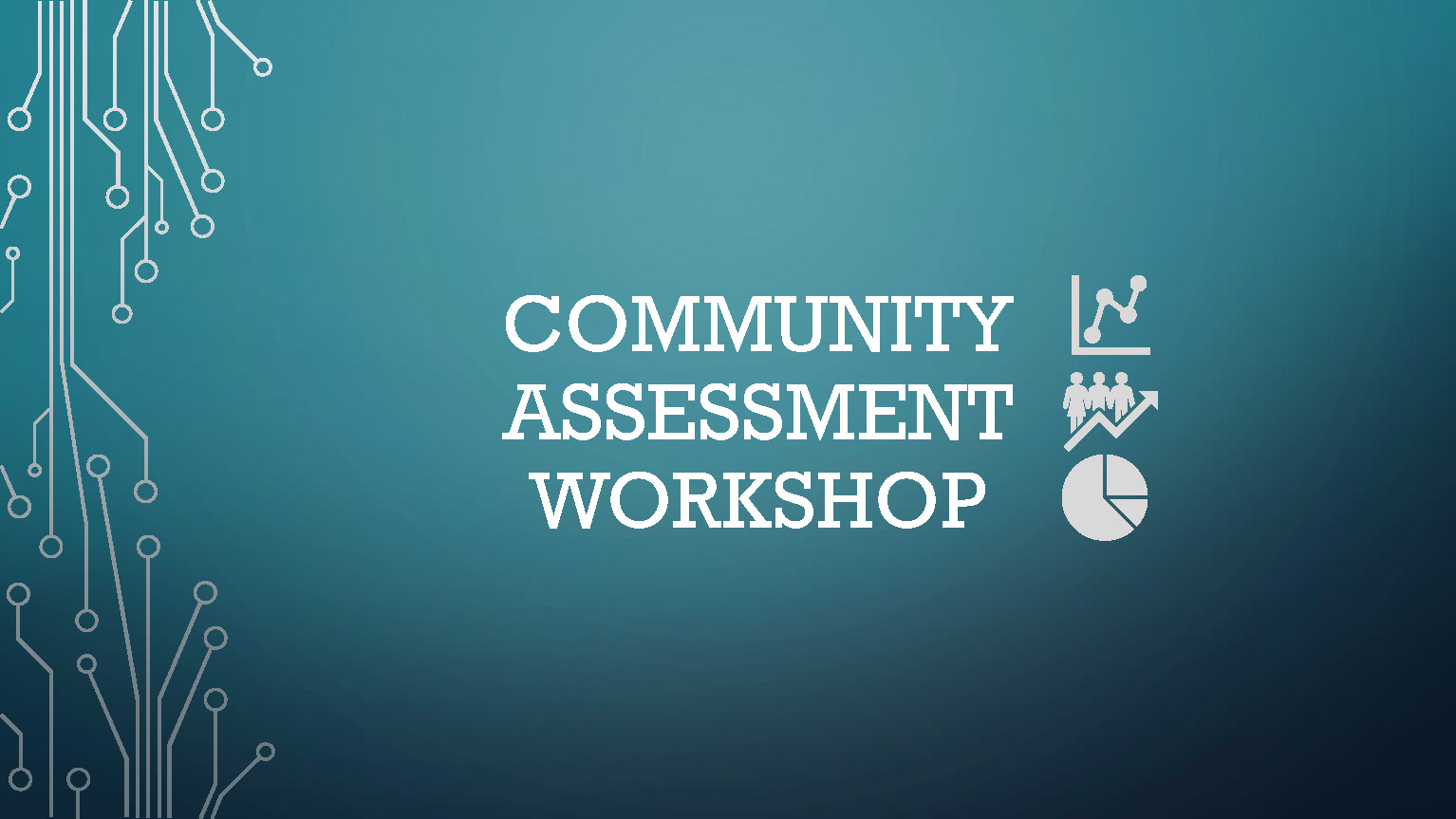 |
Community Assessment Workshop |
Aug 14, 2020 | This recorded webinar is designed to inform participants of the importance of local data, discuss how a data workgroup can design a needs assessment, and review types of data to consider when making decisions. If you were not able to watch this training live on August 14, 2020, you will now be able to watch and take a quiz in order to receive a certificate. VIEW MORE
Step one of SAMHSA’s Strategic Prevention Framework (SPF) is assessment. According to SAMHSA, “the purpose of the assessment step is to understand local prevention needs based on a careful review of data gathered from a variety of sources. These data help planners to identify and prioritize the substance misuse problems present in their community; clarify the impact these problems have on community members; identify the specific factors that contribute to these problems; assess readiness; and determine the resources required to address those factors. Ultimately, a thorough and inclusive assessment process helps to ensure that substance misuse prevention efforts are appropriate and on target.” This training is designed to inform participants of the importance of local data, discuss how a data workgroup can design a needs assessment, and review types of data to consider when making decisions. Jasynda Radanovich will deliver this training. After participating in this session, individuals will be able to: • Identify the type of data to collect (qualitative vs quantitative) • Describe the methods to collect data (surveys, focus groups, data resources, etc.) • Determine what data to collect (substance use, consequence data, perceptions, access, etc.) • Discuss risk and protective factors related to substance use • Decide when data needs to be collected and how often it needs updated • Compare local trends to state results • Examine existing data to determine the needs of a community • Understand the sections of a community needs assessment • Review the fundamental methods of how to interpret data • Encourage buy-in of data collection and assessing needs • Recognize the purpose of a logic model in community planning • Utilize a work group to collaboratively collect, interpret and update data • Relate each step of the Strategic Prevention Framework to assessment This training is required for grantees who did not have a DMHA SPF or PFS grant in 2020. Attendance is also required for any newly hired staff at organizations that received a 2020 SABG or PFS grant. Grantees who were funded in 2020 can use the month of August to take a training of choice for professional development related to prevention and/or the SPF. Each grantee should confirm with their TA provider regarding where they quality as “required attendance” or “training of your choice”. IC&RC CPS Domains met as of a result of this training: Domain 1: Task 1, 2, 4, 6, 7, 8; Domain 4: Task 1, 2; Domain 6: Task 1 |
You must sign in to register | ||||||||||||||
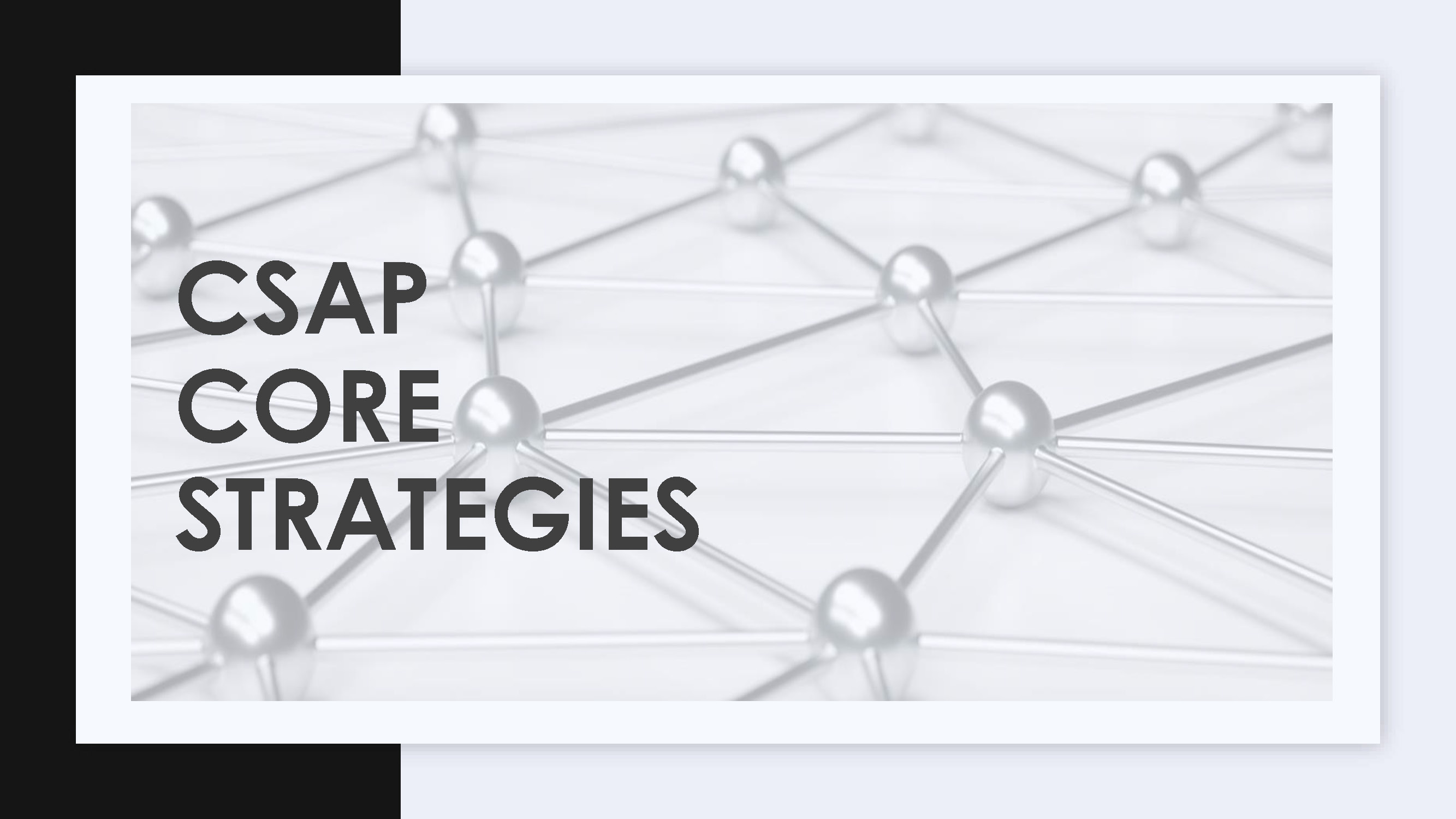 |
CSAP Core Strategies |
Sep 22, 2020 | This recorded webinar session, facilitated by Albert Gay and Jasynda Radanovich, will guide participants through each of the six CSAP Core Strategies. VIEW MORE
The Center for Substance Abuse Prevention (CSAP) is a federal agency that aims to reduce the use of illegal substances and the abuse of legal ones. CSAP encourages the use of "evidence-based programs" for drug and alcohol prevention. In accordance with this mission, six CSAP strategies were developed and approved by the Substance Abuse Mental Health Services Administration (SAMHSA). Each of these six strategies are scientifically defensible. They were created to help service providers design and implement prevention programs that work across a diversity of communities. This session, facilitated by Albert Gay and Jasynda Radanovich, will guide participants through each of the six strategies. After participating in this session, individuals will be able to: • Identify the six types of strategies • Understand how to disseminate information • Learn the types of education options for their communities • Distinguish between the types of social norms campaigns • Compare the tools available for social norms campaigns • Explore the different types of healthy alternative activities • Gain competence in problem identification and referral processes • Realize the details involved in community-based processes • Comprehend the big picture potential of environmental strategies IC&RC CPS Domains met as of a result of this training: Domain 1: Task 3, 9, 10, 12, 19; Domain 2: Task 1, 5; Domain 3: Task 1; Domain 4: Task 3, 7, 8, 9; Domain 5: Task 4, 5, 6; Domain 6: Task 1 |
You must sign in to register | ||||||||||||||
Workgroups and Leadership in Coalitions |
Jan 19, 2021 | In this recorded webinar training, participants will learn the latest strategies for forming work groups and accomplishing tasks to engage community stakeholders, achieve a shared vision, and meet specific goals. VIEW MORE
Coalitions are undoubtedly a phenomenal powerhouse of people, resources, and skills that strive to create good in a community. As a part of the community change process, leaders and work groups should work collaboratively to maximize collective impact. Whether a coalition is new or has decades of experience, work can be done to ignite or refresh the leadership and workgroups within the group. In this online training, participants will learn the latest strategies for forming work groups and accomplishing tasks to engage community stakeholders, achieve a shared vision, and meet specific goals. By the end of this training, participants will be able to:
IC&RC CPS Domains met as of a result of this training: Domain 1: Task 1, 3, 4, 15, 17, 18, 19; Domain 2: Task 5; Domain 3: Task 4, 6, 7; Domain 4: Task 2, 3, 4, 5; Domain 6: Task 1, 3, 8 |
You must sign in to register | |||||||||||||||
Milestones and Measures to Showcase Coalition Success |
Mar 4, 2021 | This recorded webinar will include how to set goals, break goals into smaller steps, stay on task, develop an understanding of the entire process, and celebrate achievements and successes along the way. VIEW MORE
This recorded webinar will allow participants to be guided through the process of setting and achieving goals. If the SPF steps are the big picture of a community framework, the milestones are specific goals within each step, and benchmarks are steps to achieving goals. The recorded webinar will include how to set goals, break goals into smaller steps, stay on task, develop an understanding of the entire process, and celebrate achievements and successes along the way. This recorded webinar will pertain to each area of the SPF, with an emphasis on reach, saturation, and impact of community strategies. Participants will learn the latest strategies on how to get started, create a plan, and implement and evaluate a plan. This recorded webinar was facilitated by Prevention Insights’ technical assistance and training staff. By the end of this recorded webinar, participants will be able to:
IC&RC CPS Domains met as of a result of this training: Domain 1: Tasks 1, 2, 3, 4, 8, 10, 11, 18; Domain 3: Tasks 5, 6; Domain 4: 3, 5, 9 |
You must sign in to register | |||||||||||||||
Engaging Health Disparate Populations |
Apr 21, 2021 | This recorded webinar discusses Engaging Health Disparate Populations. If you were not able to watch this webinar live, you will now be able to watch and take a quiz in order to receive a certificate. Participants will learn about the pertinent input that disparate populations can contribute to the local community planning process. These insights allow uninformed resources and key community stakeholders to gain an understanding that they otherwise may never have known, believed, or experienced. This training will review how to gain meaningful knowledge and tactics to bridge the gap between coalitions and the populations they serve. VIEW MORE
This recorded webinar discusses how engaging health disparate populations can be a challenging goal for any coalition involved in substance use/misuse prevention. However, it is pertinent to have their representation from the planning table to the programming that will be directed toward them. Why? Because input from these populations share significant insights on the disparities they are experiencing within the local community. These insights may allow uninformed resources and key community stakeholders to gain an understanding that they otherwise may never have known, believed, or experienced. With so much to gain, it would be a missed opportunity to not engage with people who are experiencing disparities. However, many coalitions do not know how to make meaningful contacts with these populations. This training will help bridge the gap by supplying meaningful knowledge and tactics that coalitions can apply. Albert Gay will facilitate this training. Albert has accumulated experience on health disparities and social determinants of health. He facilitates each session with an emphasis on cultural humility and institutional accountability. The following objectives will be achieved by persons attending this training:
IC&RC CPS Domains met as of a result of this training: Domain 1: Task 2, 3, 4, 5, 6, 7, 8 9, 10,18, 19; Domain 2: Task 1, 2, 3, 5; Domain 3: Task 1, 2, 3, 4, 5, 7, 8; Domain 4: Task 1, 2, 3, 4, 5, 6, 7, 8, 9; Domain 5: Task 5; Domain 6: Task 1, 2, 3, 7, 8, 9, 10 |
You must sign in to register | |||||||||||||||
Prevention Through the Context of Nontraditional Caretakers |
Jun 10, 2021 | This recorded webinar discusses Prevention through the Context of Nontraditional Caretakers. If you were not able to watch this webinar live, you will now be able to watch and take a quiz in order to receive a certificate. This training will explore prevention messaging toward non-traditional parents as well as ways to reach them with messages and recruit them into awareness events or coalition activities. Geared toward the lifespan of prevention, this training will also address prevention for senior citizens and the caretakers who provide for them. VIEW MORE
Drug prevention starts with parents; the research indicates this, and prevention providers encourage it. Parents are told to talk to their kids about drugs and guide their children toward positive alternatives. What about nontraditional parents – foster parents, grandparents, aunts, and uncles, etc.- who are taking care of non-biological children? This training will explore prevention messaging toward non-traditional parents as well as ways to reach them with messages and recruit them into awareness events or coalition activities. Geared toward the lifespan of prevention, this training will also address prevention for senior citizens and the caretakers who provide for them. As a result of this training, participants will be able to:
IC&RC CPS Domains met as of a result of this training: Domain 1: Task 3, 4, 5, 6, 7, 19; Domain 2: Task 1, 2, 3; Domain 3: Task 1, 2, 3, 4, 7; Domain 4: Task 4, 7; Domain 6: 1, 2, 3 |
You must sign in to register | |||||||||||||||
Introduction to Health Disparities |
Jun 24, 2021 | This course provides information on how to identify vulnerable populations within a community and the factors that contribute to health inequity. VIEW MORE
Health disparities refer to differences in health and heath care between groups that are closely linked with social, economic, and/or environmental disadvantage. This course provides information on how to identify vulnerable populations within a community and the factors that contribute to health inequity. Action steps are also shared on how to try to eliminate health disparities to increase each individual's good health, sense of wellbeing, and personal security. Course Learning Objectives
|
You must sign in to register | |||||||||||||||
Substance Use and HIV |
Jul 28, 2021 | Substance Use and HIV is designed for behavioral health professionals to learn the overlapping concepts of substance use and HIV. VIEW MORE
Substance Use and HIV is designed for behavioral health professionals to learn the overlapping concepts of substance use and HIV. HIV/AIDS is a decades long pandemic, and substance use can be factored into transmission of the virus, exacerbation of symptoms and treatment plans. This course can be used by many professions including mental health, criminal justice, health care, education, law enforcement, substance abuse prevention, social work, youth development, behavioral health, faith-based, and treatment and recovery.
|
You must sign in to register | |||||||||||||||
 |
Preventing and Reducing Stigma |
Aug 18, 2021 | During this recorded webinar, participants will examine the components that contribute to stigma, and examine the topic through an ecological model of structural stigma, public stigma, and self-stigma. Participants with varying levels of knowledge and experience with stigma reduction can benefit from this training. VIEW MORE
Description: Stigma reduction is a common topic in recent publications and social media. Prevention professionals have long known that stigma can create a barrier to treatment and recovery; however, there are also challenges in knowing how to instill stigma reduction in prevention practices. In a blog written by Dr. Voklow in 2020, she wrote “little progress has been made in removing the stigma around substance use disorders. People with addiction continue to be blamed for their disease. Even though medicine long ago reached a consensus that addiction is a complex brain disorder with behavioral components, the public and even many in healthcare and the justice system continue to view it as a result of moral weakness and flawed character.” In this recorded webinar, participants will examine the components that contribute to stigma, and examine the topic through an ecological model of structural stigma, public stigma, and self-stigma. Participants with varying levels of knowledge and experience with stigma reduction can benefit from this training. Research-based content will be shared by the presenter and participants can expect opportunities for discussion, self-examination, and real-world application of practices to address and prevention stigma. Participants will also receive a PowerPoint and resources that can be downloaded and customized for their own use, i.e., for community training. By the end of the training, participants will be able to:
Chuck Klevgaard, a nationally recognized expert in substance misuse prevention and public health, will lead this training. Drawing on his experience in collective impact and prevention-focused partnerships, Chuck builds the capacity of states, tribes, schools, communities, and cities to use evidence-based substance misuse prevention and intervention strategies. He specializes in behavioral health support; training and technical assistance; and evidence-based alcohol, opioid, and substance misuse programs and policies. As a consultant to Great Lakes Prevention Technology Transfer Center, Klevgaard provides training and technical assistance on evidence-based stigma prevention and reduction to substance misuse prevention entities within the Great Lakes region.
|
You must sign in to register | ||||||||||||||
 |
Community Collaboration: Political Systems as a Key Stakeholder for Prevention |
Oct 1, 2021 | This recorded webinar provides training to increase capacity to work with local political systems, navigate the political environment of your community and recruit stakeholders into the prevention realm. VIEW MORE
This recorded webinar provides training to increase capacity to work with local political systems, navigate the political environment of your community and recruit stakeholders into the prevention realm. Community Collaboration: Political Systems as a Key Stakeholder for Prevention Description: Mobilizing political support is one of the many tasks of a prevention specialist; however, a recent workforce assessment revealed that individual who identified as DMHA sub-recipients have basic knowledge and/or limited experience of working within local political systems. This training will increase capacity to work with local political systems, navigate the political environment of your community and recruit stakeholders into the prevention realm. Training objectives:
Who should attend: Grantees are required to attend this training. SABG-funded organizations are strongly encouraged to invite coalition members and key stakeholders, especially those involved in advocacy and policy. IC&RC CPS Domains related to this training: Domain 4: Task 2, 3, 4, 7, 8. Domain 5: Task 1, 3, 5, 6. |
You must sign in to register | ||||||||||||||
.jpg) |
SABG Mental Health Update |
Mar 2, 2022 | This recorded webinar will serve as a mental health update for prevention specialists. Participants will learn the current main contributors to mental health problems, best practices for prevention and treatment, and review needs assessment data. VIEW MORE
This recorded webinar will serve as a mental health update for prevention specialists. Participants will learn the current main contributors to mental health problems, best practices for prevention and treatment, and review needs assessment data. The training will include:
Jasynda Radanovich will facilitate this training. Jasynda is an instructor of Mental Health First Aid and Question, Persuade, Refer (QPR) Suicide Prevention Training. She is a trainer of trainers for Communities That Care and Screening, Brief Intervention and Referral to Treatment. She has experience as a technical assistance project officer, providing guidance and leadership to communities to interpret and prioritize data, build coalition capacity, plan for sustainability, select and implement evidence-based strategies with fidelity and overall compliance with state-funded contracts. Ms. Radanovich also serves an adjunct faculty instructor for the School of Public Health-Bloomington and is a Master Certified Health Education Specialist. Who should attend: Grantees are required to attend this training. SABG-funded organizations are encouraged to invite staff, program facilitators, coalition members and anyone who helps with strategic planning. IC&RC CPS Domains met as of a result of this training: Domain 1: Task 1, 2, 6, 7. Domain 2: Task 1, 2. Domain 4: Task 4. Domain 6: Task 1, 3, 4. Pre-work: Read The Impact of COVID-19 on Minority Mental Health from the National Council on Mental Wellbeing |
You must sign in to register | ||||||||||||||
.jpg) |
SABG Evaluation Review |
Jan 6, 2022 | This recorded webinar session was designed as a workshop focused on specific participant knowledge and needs, which will be informed by an assessment. VIEW MORE
Recorded Webinar Topics: Evaluation, Results, Measure, Data, Interpretation, Process, Outcome, Logic Models, Strategic Decisions Description: In a recent workforce assessment, recipients of DMHA funding reported a high need of evaluation education and training. Specifically, the areas of need reported were: deciding what to measure/evaluate, creating an evaluation plan, creating an evaluation report, communicating evaluation results (format, readability, timing, relevance, quality), deciding when to measure (when and how often), understanding process vs outcome evaluation, linking logic models to evaluation findings, understanding and interpreting evaluation data, and using evaluation data to guide the next steps. This training will be designed as a workshop focused on specific participant knowledge and needs, which will be informed by an assessment (read pre-work below). Prevention Insights staff with evaluation expertise will facilitate this training. Who should attend: Grantees are required to attend this training. SABG-funded organizations are strongly encouraged to invite program facilitators, coalition members, and the evaluation workgroup. IC&RC CPS Domains met as of a result of this training: Domain 1: Task 1, 9, 11, 12, 16, 17, 18 Pre-work: Before the training, Prevention Insights will send out an assessment. This assessment will be a chance to directly survey grantees and gauge their knowledge and needs regarding evaluation. The training will be tailored from the results. |
You must sign in to register | ||||||||||||||
.jpg) |
Prevention Skills Training |
Jan 25, 2022 | The Prevention Skills Training will offer a comprehensive introduction to the substance abuse prevention field. Grounded in current research and the Substance Abuse and Mental Health Services Administration’s (SAMHSA) Strategic Prevention Framework (SPF), this training is designed to help practitioners develop the knowledge and skills needed to implement effective, data-driven prevention. VIEW MORE
|
Registration Closed | ||||||||||||||
.jpg) |
Community Collaboration and Mobilization |
Mar 9, 2022 | This recorded webinar will focus on building, fostering, solidifying, and maintaining collaborative relationships, along with the key steps in mobilizing a community. Staff from Prevention Insights will deliver this training. VIEW MORE
Description: Collaboration is a term often used in community-oriented work. Collaboration can mean working together, forging relationships to accomplish goals and contributing time, effort and resources to a cause. Mutually agreed-upon focus and priorities create long-lasting, efficient change among like-minded organizations. Moreover, this process creates broad-based community involvement and ownership. This training will focus on building, fostering, solidifying, and maintaining collaborative relationships, along with the key steps in mobilizing a community. Staff from Prevention Insights will deliver this training. As a result of this recorded webinar, participants will gain knowledge and build skills in: • Understanding and assessing community readiness • Making connections in key stakeholder groups • Communication methods for key stakeholder groups • Developing Memorandum of Understanding for collaborative efforts • Using more than financial agreements as in-kind support • Securing resources to implement strategies, work plans and overall prevention efforts • Creating outcomes to ensure accountability for resources • Strategies for holding organizations, coalitions, and workgroups accountable and committed to processes • Confirming milestones and benchmarks to create accountability • Creating opportunities for community organization and shared goals • Decreasing turf conflict, duplication or fragmentation of resources and problem du jour • Avoiding use of untested or proven ineffective programs • Raising awareness of the substance issue in the community • Communicating the prevention process and timeline to community members |
You must sign in to register | ||||||||||||||
 |
SBIRT Implementation: Best Practices for Sustaining SBIRT |
May 24, 2022 | Online Training (1 hour); This module is a step-by-step guide for implementing Screening, Brief Intervention, and Referral to Treatment (SBIRT) within an outpatient healthcare setting. CEUs are available for purchase on IU Expand. VIEW MORE
Welcome to the SBIRT Implementation module. This educational module has been designed for professionals and students in many fields, including healthcare, mental health, justice/legal, education, substance abuse prevention, and public health. Note: To receive CEUs for this course, please go to IU Expand, create an account, and then register for this course on IU Expand. The cost is $15 for 1 CEU. If you do not wish to purchase CEUs, you may take this course for free on this website and get a certificate of participation. The purpose of this hour-long module is to provide a step-by-step understanding for implementing Screening, Brief Intervention, and Referral to Treatment (SBIRT) within an outpatient healthcare setting. By the end of the module, you will have completed the following objectives:
|
You must sign in to register | ||||||||||||||
How to Select Prevention Strategies |
Jun 17, 2022 | This online learning course will assist communities in selecting a prevention strategy to address local concerns. VIEW MORE
The Substance Abuse and Mental Health Service Administration (SAMHSA) is an agency within the United States Department of Health and Human Services that focuses on advancing the behavioral health of the nation. SAMHSA has several branches within the administration to promote its goals and progress. The Center for Substance Abuse Prevention (CSAP) is a branch and national council. CSAP works with state, federal, private, and public organizations to provide services for diseases, disorders, and prevention. CSAP also encourages the use of evidence-based programs for drug and alcohol prevention. This course will introduce the CSAP Core Strategies, which are used to carry out this important work. Course Learning Objectives
This course was developed by Prevention Insights- Indiana University School of Public Health Bloomington, with funding and support from the Indiana Division of Mental Health and Addiction. |
You must sign in to register | |||||||||||||||
Coalition Start-up |
Jun 23, 2022 | This online learning course will assist communities in starting up a coalition to address local concerns. VIEW MORE
One of the integral keys to improve community health and sustain local efforts is to engage and retain a group of committed, concerned individuals. This group of people is a coalition, and it serves as a mechanism for continued success and impact. This course will review best practices and experiences in forming community organizations. Course Learning Objectives Define a coalition and its importance Select ways to engage and develop relationships with key stakeholders Support action steps for a high performing coalition Assess the role of cultural competency in coalitions |
You must sign in to register | |||||||||||||||
Building Community Ownership of Strategies/Programs |
Sep 8, 2022 | This recorded webinar training will provide information on continuing programs and finding ongoing financial backing after a grant has ended. VIEW MORE
Please note: We had technical difficulties with the recording of this webinar. The first 2-3 minutes had to be deleted. Recorded webinar training. Topics: Balancing community/coalition/organization input, transferring ownership of interventions to the community, other sources of funding, technical assistance Format/Location: Online via Zoom. Access link after registration via the Prevention Insights training portal. Description: Sustainability is an important part of the Strategic Prevention Framework (SPF) process. Community prevention programs do not have to end just because a grant has ended. It is important to find ways to continue programs and find the ongoing financial backing. This training will discuss how to build community ownership of strategies/programs. By the end of this training, participants will be able to:
Who should attend: Grantees are required to attend this training. SABG and CRRSA funded organizations are strongly encouraged to invite coalition members and key stakeholders, especially those involved in continuing programming. IC&RC CPS Domains related to this training: Domain 2: Task 1, 5. Domain 4: Task 2, 3, 4, 5, 7, 8. Suggested Pre-work: Read article: Sustainability After the Money Runs Out Suggested Post-work: Consider using the downloadable PowerPoint or videos provided to present this topic to your coalition, stakeholders, program facilitators, etc. From there, explore what sustainability practices your coalition can implement right away and what options can be considered for future planning. Additional Resources: Additional resources will be provided in the training packet distributed at the event. |
You must sign in to register | |||||||||||||||
Selecting Culturally Appropriate Strategies |
Dec 1, 2022 | During this recorded webinar we will discuss the importance of our own culture and the cultures around us in which we live, work, and especially those in which we serve others in order to select appropriate strategies. VIEW MORE
Recorded webinar description: It is important to understand our own culture and the cultures around us in which we live, work, and especially those in which we serve others. Much work has been done in prevention to increase cultural knowledge, awareness, sensitivity, competency, and humility. Equally important is the concept of selecting culturally appropriate strategies. As a result of the training participants will be able to:
Who should attend: Grantees are required to attend this training. SABG and CRRSA funded organizations are strongly encouraged to invite staff, program facilitators, and coalition members. IC&RC CPS Domains met as of a result of this training: Domain 1: Task 10, 11; Domain 2: Task 2, 3; Domain 4: Task 1 Pre-work: Read article: Cultural Sensitivit in Public Health: Defined and Demystified at https://pubmed.ncbi.nlm.nih.gov/10355471/ Post-work: Consider using the downloadable PowerPoint or videos provided to present this topic to your coalition, stakeholders, program facilitators, etc. From there, explore what sustainability practices your coalition can implement right away and what options can be considered for future planning. Additional Resources: Incorporating Cultural Competence into Your Comprehensive Plan created by CADCA Authentic Community Engagement to Advance Equity, Office of Health Equity, Colorado Department of Public Health & Environment |
You must sign in to register | |||||||||||||||
Substance Abuse Prevention Skills Training (SAPST) |
Jan 17, 2023 | The Substance Abuse Prevention Skills Training (SAPST) will offer a comprehensive introduction to the substance abuse prevention field. VIEW MORE
Substance Abuse Prevention Skills Training (SAPST) Date: January 17-20 Time: 9:00am-5:00pm EST each day Topics: Prevention, Strategic Prevention Framework, Assessment, Data, Coalitions, Community Involvement, Capacity, Planning, Implementation, Evaluation, Sustainability, Cultural Competency, Health Disparities Format/Location: In person; location Indiana Wesleyan University Greenwood Education and Conference Center 1500 Windhorst Way Greenwood, IN 46143 Description: The Prevention Skills Training will offer a comprehensive introduction to the substance abuse prevention field. Grounded in current research and the Substance Abuse and Mental Health Services Administration’s (SAMHSA) Strategic Prevention Framework (SPF), this training is designed to help practitioners develop the knowledge and skills needed to implement effective, data-driven prevention. Using case scenarios, participants will work through each of the SPF steps - assessment, capacity, planning, implementation, and evaluation. Participants get the opportunity to assess data and prioritize risk and protective factors; engage in capacity-building activities and assess community resources and readiness; infuse cultural competency and sustainability in community planning; employ activities to determine best practical fit for implementation; and determine effective measures for short-and long-term evaluation. By the end of the training, participants will be able to:
Who should attend: Grantees are required to attend this training if they have not attended since 2012. If a grantee has attended since that date, DMHA suggests that another staff member be considered. If/when all the agency’s DMHA-funded program staff have completed this training, there is an option to rotate staff through again as a refresher or attend a training of your choice. SABG and CRRSA funded organizations are strongly encouraged to invite coalition members to attend the training. IC&RC CPS Domains related to this training: Domain 1: Task 1, 2, 3, 4, 5, 6, 7, 8, 9, 10, 11, 16; Domain 2: Task 1, 2, 3, 4; Domain 3: Task 2; Domain 4: Task 1, 2, 4, 5, 6, 9; Domain 5: Task 1, 5; Domain 6: Task 1, 9, 10 Pre-work: Prior to the training, participants should complete the self-paced module Prevention 101 on the Prevention Insights training portal. Participants should also respond to pre-training emails and surveys that help the instructors facilitate the training.
Additional Resources: Additional resources will be provided in the training packet distributed at the event. |
Registration Closed | |||||||||||||||
Involving the Target Population in All Phases of Prevention |
Feb 9, 2023 | This recorded webinar will offer comprehensive instruction on incorporating the target population in all phases of prevention. VIEW MORE
Topics: Recruiting, focus groups, key informant interviews, and target population Description: This training will offer comprehensive instruction on incorporating the target population in all phases of prevention. This training is designed to help practitioners develop the knowledge and skills needed to implement culturally responsive programs. Participants get the opportunity to ensure cultural responsiveness in the community, coalition, and strategies. By the end of the training, participants will be able to:
Who should attend: Grantees are required to attend this training. SABG and CRRSA funded organizations are strongly encouraged to invite coalition members and key stakeholders. IC&RC CPS Domains related to this training: Domain 1: Task 5, 6, 7, 19; Domain 2: Task 2; Domain 4: Task 1, 2 Pre-work: Read article- Gateway to Health Communication: Know Your Audience Post-work: Consider using the downloadable PowerPoint or videos provided to present this topic to your coalition, stakeholders, program facilitators, etc. From there, explore what sustainability practices your coalition can implement right away and what options can be considered for future planning. Additional Resources: Additional resources will be provided in the training packet distributed at the event |
You must sign in to register | |||||||||||||||
Stress Management |
Apr 6, 2023 | This training will offer insights on how to manage and prevent stress. VIEW MORE
Stress Management Date: April 6 Time: 9:00am-4:00pm EST Topics: Identifying stressors, improving focus and intention, dealing with stress effectively Format/Location: In-person Indiana Wesleyan University Greenwood Education Center 1500 Windhorst Way Greenwood, IN 46143 Description: Stress is a fact of life. It is how we react (physically and emotionally) when we feel under pressure or threatened. Often, it will happen when we are in a situation that we don’t feel we can manage or control. This training will offer insights on how to manage and prevent stress. As a result of the training, participants can expect to be able to:
Who should attend: Grantees are required to attend this training. SABG and CRRSA funded organizations are strongly encouraged to invite coalition members and stakeholders. IC&RC CPS Domains met as of a result of this training: Domain 6: Task 4 Pre-work: Watch video-Stress: Portrait of a Killer (1 hour) Post-work: Consider using the downloadable PowerPoint or videos provided to present this topic to your coalition, stakeholders, program facilitators, etc. From there, explore what sustainability practices your coalition can implement right away and what options can be considered for future planning. Additional Resources: Additional resources will be provided in the training packet distributed at the event
|
You must sign in to register | |||||||||||||||
Grant Writing Workshop and Alternative Funding Streams |
May 3, 2023 | This comprehensive workshop will encompass the vital aspects of writing a proposal that gets funded. We will also discuss alternative funding streams. VIEW MORE
Date: May 3 and 4 Time: 9:00am-5:00pm Topics: grant writing and alternative funding streams Format/Location: In person; Central Library Branch of the Indianapolis Public Library 40 East St. Clair Street Indianapolis, IN 46204. Riley Meeting Room (Please note: we will be entering the library before it opens to the public!) Parking The Central Library has a parking garage available to patrons during their time at the Library. Garage pricing information is detailed below. The garage can be accessed on Pennsylvania Street.
We are within walking distance of restaurants and especially those on along Mass. Ave.
Description: This comprehensive workshop will encompass the vital aspects of writing a proposal that gets funded. Participants will be able to write grant sections in real time or create an organizational boilerplate for later use by completing commonly requested grant sections, including community overview; coalition or board history; organizational structure; capacity and capability; needs assessment; problem statement and SMART objectives; inclusivity and engagement; intervention implementation; and monitoring, evaluation, and outcomes. We will also examine how to diversify funding streams after a grant ends. As a result of this training, participants can expect to be able to: • Map out all aspects of grant writing including how to get started and which areas to write first • Follow a rubric to achieve a high score • Use powerful sentence structure to write effectively and efficiently • Provide data in an appropriate way to tell a compelling story • Describe a problem within an organization to showcase funding need • Compare a local problem or deficit with other geographical areas to prove need • Outline where the organization has been and its future plans in terms of goals, vision and mission • Organize timelines and milestones • Utilize a crosswalk resource which features sections from a multitude of grants and request for proposals IC&RC CPS domains met as a result of this training: Domain 1: Task 3, 4, 5, 8, 11, 12, 19; Domain 2: Task 1, 2; Domain 4: Task 1, 2, 7, 8; Domain 5: Task 3, 5; Domain 6: Task 1, 2, 6 Who should attend: Grantees are required to attend this training. SABG and CRRSA funded organizations are strongly encouraged to invite staff, program facilitators, coalition members, and members of the grant writing workgroup. Pre-work: Gather and bring documents related to a grant your organization has applied or a grant you will apply for in the future. Post-work: Consider using the downloadable PowerPoint or videos provided to present this topic to your coalition, stakeholders, program facilitators, etc. From there, explore what grant writing and funding stream practices your coalition can implement right away and what options can be considered for future planning. Additional resources: Additional resources will be provided in the training packet distributed at the event. |
You must sign in to register | |||||||||||||||
Introduction to Cultural Competency |
Jun 30, 2016 | This online training will review cultural competency and its roll in the Strategic Prevention Framework (SPF). VIEW MORE
Cultural Competence has multiple definitions. Each discipline has adapted a definition of cultural competence that suits its conditions and characteristics. Despite the debate about the definition of cultural competence, scholars continue to use it. A culturally competent organization is one with policies in place to address diversity, creating a culture of respect and support for members, staff, and community partners (Betancourt et al., 2002). Organizational cultural competence is comprised of the strategic efforts made on a systems level to meet the needs of stakeholders of diverse backgrounds.
The Substance Abuse Mental Health Services Administration (SAMHSA) developed a guide for prevention professionals. The Strategic Prevention Framework (SPF) is a community based approach to prevention that uses a planning process to select, implement, and evaluate effective, culturally appropriate, and sustainable prevention activities. Cultural competency should be intertwined throughout the SPF process.
|
You must sign in to register | |||||||||||||||
 |
Coalition Management |
Mar 14, 2023 | This online training course will review best practices and experiences in managing and sustaining community coalitions or organizations. VIEW MORE
The "Coalition Start Up" course is a prerequisite to this course and should be completed prior to taking this course. In the previous course, we introduced several topics, such as defining a coalition, assembling membership, outlining the vision and mission, determining how a coalition will function, and assessing capacity. By the end of this training, pariticipants will be able to:
|
You must sign in to register | ||||||||||||||
 |
Vaping: Overview of Data, Devices, and Regulations |
Jun 30, 2023 | This self-guided course on vaping has been designed using information from many fields including health care, justice/legal, education, substance abuse, and prevention. Learners should gain understanding about trends, how products have evolved, as well as local and national strategies for prevention and intervention. VIEW MORE
By the end of this training, pariticipants will be able to:
|
You must sign in to register | ||||||||||||||
 |
Certified Prevention Specialist: How and Why? |
Jun 23, 2023 | This course walks you through the process of obtaining your Certified Prevention Specialist (CPS) Credential. VIEW MORE
By the end of this training, pariticipants will be able to:
|
You must sign in to register | ||||||||||||||
 |
Certified Prevention Specialist Exam Prep |
Jun 23, 2023 | The IC&RC Certified Prevention Specialist Exam Preparation Module is a self-paced course designed to review key prevention concepts and help prepare individuals to take the Prevention Specialist exam offered by the International Certification & Reciprocity Consortium (IC&RC). VIEW MORE
By the end of this training, pariticipants will be able to:
|
You must sign in to register | ||||||||||||||
 |
Adverse Childhood Experiences (ACEs) & Positive Childhood Experiences (PCEs) |
Aug 3, 2023 | This recorded webinar training will offer a comprehensive introduction to Adverse Childhood Experiences (ACEs) and Positive Childhood Experiences (PCEs). VIEW MORE
|
You must sign in to register | ||||||||||||||
Introduction to SAMHSA's 4 Es |
Nov 2, 2023 | This webinar will provide a comprehensive introduction to the Substance Use Disorder Prevention System. Preventionists will gain necessary knowledge and skills to address early action, easy access, equitable opportunities, and effective delivery. VIEW MORE
|
You must sign in to register | |||||||||||||||
Application of SAMHSA's 4 E's Using the SPF |
Dec 7, 2023 | This recorded webinar reviews a comprehensive strategy of applying the 4 Es using the SPF. Prevention professionals will gain necessary knowledge and skills to address early action, easy access, equitable opportunities, and effective delivery. VIEW MORE
|
You must sign in to register | |||||||||||||||
Communication Techniques for the Prevention Specialist |
Feb 8, 2024 | This recorded webinar is designed for prevention professionals to address the job tasks of the Communication Domain of the CPS credential. VIEW MORE
|
You must sign in to register | |||||||||||||||
.jpeg) |
Grant Writing: From Proposal to Submission |
Jan 15, 2024 | This self-guided course on grant writing has been designed for learners to gain an understanding of the grant-writing process, tools to enhance grant proposals, as well as common strategies to utilize and mistakes to avoid. VIEW MORE
By the end of this course, participants will be able to:
|
You must sign in to register | ||||||||||||||
 |
How to Start a Nonprofit |
Jun 10, 2024 | This self-guided, online course on nonprofits has been designed for learners to understand how to start a nonprofit organization. NOTE: Seeking professional advice from an attorney, accountant, and/or professional tax advisor is advisable during this process. VIEW MORE
This self-guided, online course on nonprofits has been designed for learners to understand how to start a nonprofit organization. NOTE: Seeking professional advice from an attorney, accountant, and/or professional tax advisor is advisable during this process. Learning Objectives Describe activities associated with becoming a nonprofit. Select tools and resources to assist with the nonprofit application process. Assess the needs of your community. Support an effective business plan. Conclude the nonprofit process and publicize your nonprofit.
|
You must sign in to register | ||||||||||||||
Online Learning Experience: Introduction to Motivational Interviewing (MI) |
Oct 15, 2024 | October 15, 2024, 9:00am-3:30pm ET, ONLINE; Cost: $99/person VIEW MORE
What to Expect: This online facilitated learning forum will be a highly engaging and interactive seven-hour experience for a multi-disciplinary audience. Individuals will engage in experiential methods such as information exchange, small group discussion, paired skills practice, video analysis, and other self-reflective processes. Audience: Counselors, social workers, graduate students or healthcare professionals who have direct patient/client interactions. All levels of skill are welcome. Objectives: ¨ Define Motivational Interviewing and discuss uses with clients/patients -Explore ambivalence as a barrier to change ¨ Examine and practice the Spirit of Motivational Interviewing ¨ Practice core skills of Motivational Interviewing Trainer: Mallori DeSalle Motivational Interviewing Trainer Member of the Motivational Interviewing Network of Trainers (MINT) |
Registration Closed | |||||||||||||||
 |
January 2025 Virtual Grant Writing Support |
Jan 9, 2025 | This virtual luncheon session will offer grant writing assistance for those pursuing local, state, or federal prevention funding. VIEW MORE
This virtual luncheon session will offer grant writing assistance for those pursuing local, state, or federal prevention funding. Join us as Hope McMickle and Rebecca Mueller share their technical assistance expertise in writing grants. They will be available to answer questions and provide support and resources for the grant writing process. Virtual Session January 9, 2025 12-12:45pm Zoom link will be provided once you register for the session. |
You must sign in to register | ||||||||||||||
 |
March 2025 Virtual Grant Writing Support |
Mar 6, 2025 | This virtual luncheon sessions will offer grant writing assistance for those pursuing local, state, or federal prevention funding. VIEW MORE
This virtual luncheon session will offer grant writing assistance for those pursuing local, state, or federal prevention funding. Join us as Hope McMickle and Rebecca Mueller share their technical assistance expertise in writing grants. They will be available to answer questions and provide support and resources for the grant writing process. Virtual Session March 6, 2025 12-12:45pm Zoom link will be provided once you register for the session. |
Registration Closed | ||||||||||||||
 |
CANCELLED: May 2025 Virtual Grant Writing Support |
May 1, 2025 | This virtual luncheon session will offer grant writing assistance for those pursuing local, state, or federal prevention funding. VIEW MORE
This virtual luncheon session will offer grant writing assistance for those pursuing local, state, or federal prevention funding. Join us as Hope McMickle and Rebecca Mueller share their technical assistance expertise in writing grants. They will be available to answer questions and provide support and resources for the grant writing process. Virtual Session May 1, 2025 12-12:45pm Zoom link will be provided once you register for the session. |
Registration Closed | ||||||||||||||
Online Learning Experience: Introduction to Motivational Interviewing (MI) |
Jan 31, 2025 | January 31, 2025, 9:00am-3:30pm ET, ONLINE; Cost: $99/person VIEW MORE
What to Expect: This online facilitated learning forum will be a highly engaging and interactive seven-hour experience for a multi-disciplinary audience. Individuals will engage in experiential methods such as information exchange, small group discussion, paired skills practice, video analysis, and other self-reflective processes. Audience: Counselors, social workers, graduate students or healthcare professionals who have direct patient/client interactions. All levels of skill are welcome. Objectives: ¨ Define Motivational Interviewing and discuss uses with clients/patients -Explore ambivalence as a barrier to change ¨ Examine and practice the Spirit of Motivational Interviewing ¨ Practice core skills of Motivational Interviewing Trainer: Mallori DeSalle Motivational Interviewing Trainer Member of the Motivational Interviewing Network of Trainers (MINT) |
Registration Closed | |||||||||||||||
Online Learning Experience: Introduction to Motivational Interviewing (MI) |
Mar 28, 2025 | March 28, 2025, 9:00am-3:30pm ET, ONLINE; Cost: $99/person VIEW MORE
What to Expect: This online facilitated learning forum will be a highly engaging and interactive seven-hour experience for a multi-disciplinary audience. Individuals will engage in experiential methods such as information exchange, small group discussion, paired skills practice, video analysis, and other self-reflective processes. Audience: Counselors, social workers, graduate students or healthcare professionals who have direct patient/client interactions. All levels of skill are welcome. Objectives: ¨ Define Motivational Interviewing and discuss uses with clients/patients -Explore ambivalence as a barrier to change ¨ Examine and practice the Spirit of Motivational Interviewing ¨ Practice core skills of Motivational Interviewing Trainer: Mallori DeSalle Motivational Interviewing Trainer Member of the Motivational Interviewing Network of Trainers (MINT) |
Registration Closed | |||||||||||||||